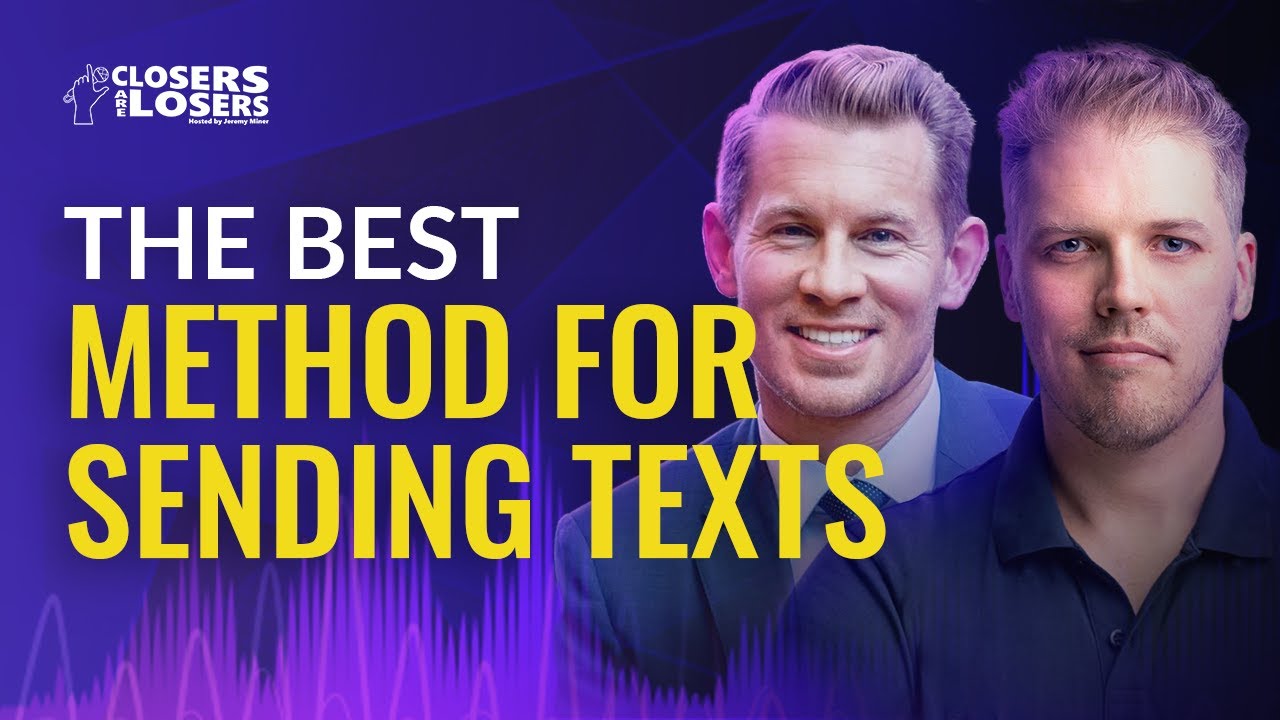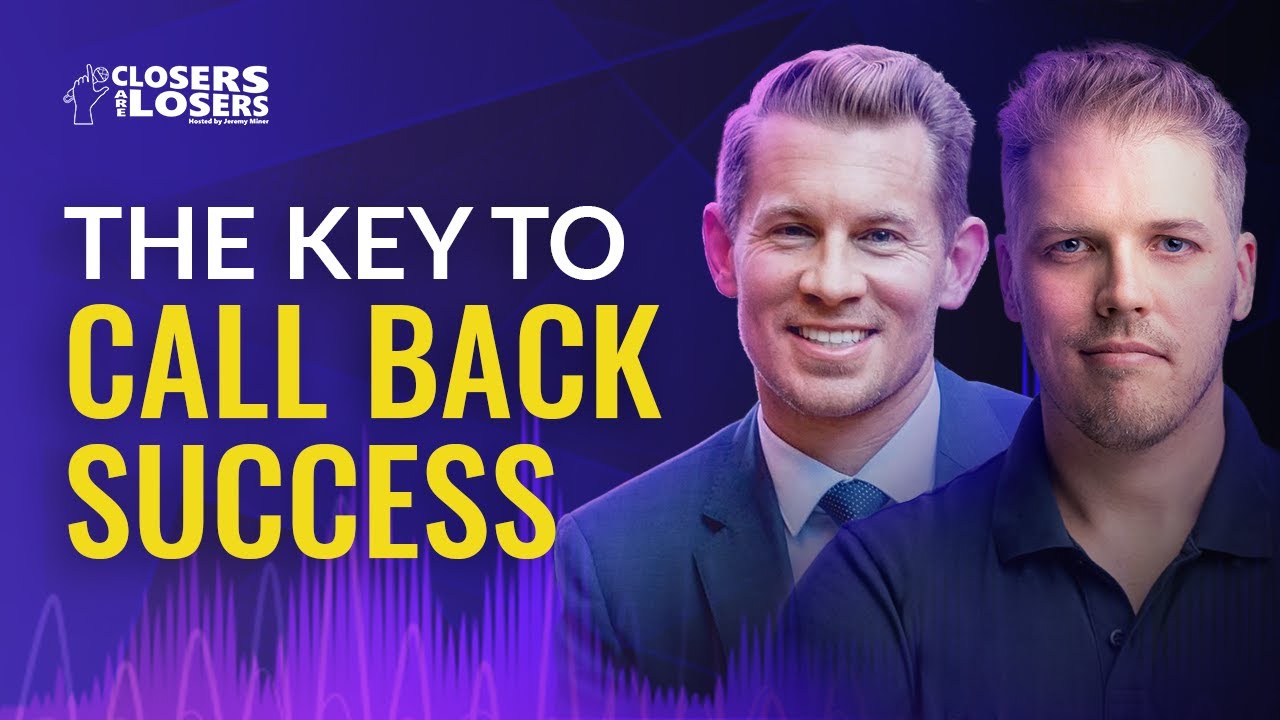3 Common Mistakes All Sales People Make
Summary
TLDRIn this episode of 'Closers are Losers', host Jeremy Miner interviews Mac, a lead account manager, on overcoming sales objections. Mac emphasizes the importance of not just addressing what the prospect says, but understanding their true needs and concerns. He discusses the art of verbal pacing and pausing to encourage deeper engagement and reveals the significance of asking the right questions to uncover hidden problems. The conversation highlights the value of situational questions in diagnosing the real issues, and the necessity of actively listening to what prospects mean beyond their words. Mac shares insights on handling objections effectively and the importance of structure in sales conversations to ensure consistent results.
Takeaways
- 😀 Salespeople often trigger objections due to their tone or the way they phrase questions, making prospects feel sold to.
- 🔍 It's crucial for salespeople to understand that objections are reactions to their approach, not just inherent issues with the product or service.
- 💡 The script emphasizes the importance of not just asking questions but also listening to the prospect's needs and concerns to build trust and understanding.
- 🚀 Salespeople should avoid 'bulldozing' by not overwhelming the prospect with too many questions or solutions too quickly, which can lead to surface-level interactions.
- 💭 The concept of 'verbal pacing' is introduced as a technique to engage prospects by slowing down the delivery of questions, allowing them to engage more deeply.
- 💼 Salespeople need to be aware of their own tone and how it can influence the prospect's reaction, potentially triggering objections.
- 📈 The script suggests that many salespeople struggle with uncertainty in their sales approach, lacking a structured method to handle objections or close deals.
- 🎯 Effective sales involve diagnosing the prospect's real situation rather than assuming what their needs are based on initial interactions.
- 👥 Salespeople should be trained to interpret non-verbal cues and listen actively to what prospects mean, not just what they say.
- 📚 The script promotes continuous learning and improvement, suggesting that salespeople should seek structured training and utilize resources like Facebook groups and books for advancement.
Q & A
What is the main issue salespeople face when dealing with objections?
-Salespeople often face objections because they may use certain words or ask questions in a way that triggers a defensive reaction in the prospect. They might not be delving deep enough to understand the prospect's emotional needs or they could be using a tone that makes the prospect feel like they are being sold to.
Why do prospects sometimes feel like they are being sold to during a sales pitch?
-Prospects may feel like they are being sold to if the salesperson uses a tone that is too enthusiastic or asks surface-level questions that don't allow the prospect to emotionally open up. This can lead to a perception of being 'bulldozed' by sales tactics rather than having a genuine conversation.
What is the significance of verbal pacing and pausing in sales?
-Verbal pacing and pausing are crucial in sales as they allow the salesperson to match the prospect's speech pattern, which can build rapport. Pausing gives the prospect time to internalize questions, leading to more thoughtful and revealing answers, while pacing ensures the salesperson is not rushing through questions, allowing for deeper engagement.
How can salespeople identify and address hidden problems or objections?
-Salespeople can identify hidden problems by actively listening and observing non-verbal cues. They should ask clarifying questions to delve deeper into the prospect's concerns and use techniques like neuro-emotional persuasion questioning to uncover the real needs and objections that the prospect may not be aware of.
What is the importance of not selling to just the needs a prospect states, but uncovering the real situation?
-It is important to not just sell to the stated needs of a prospect because they may not fully understand their own situation or the depth of their problems. By uncovering the real situation through diagnostic questions, a salesperson can provide a more tailored solution that addresses the core issues, leading to a more satisfying outcome for the prospect.
Why is it counterproductive to jump immediately into a solution when a prospect describes a problem?
-Jumping immediately into a solution when a prospect describes a problem can be counterproductive because it may not address the prospect's most critical needs. It's important to first understand the full scope of the problem and related issues through questioning before presenting a solution.
How can salespeople use the concept of 'NPQ' or Neuro-Emotional Persuasion Questioning in their sales process?
-Salespeople can use NPQ by asking questions designed to uncover the emotional drivers behind a prospect's needs. This involves understanding how the brain makes decisions and using that knowledge to craft questions that help prospects realize the importance of solving their problems, thus making the sales process more effective.
What is the role of situation questions in the sales process?
-Situation questions play a role in the sales process by helping the salesperson understand the prospect's current situation and by helping the prospect understand the reality of their situation. These questions are crucial for building a gap between where the prospect is now and where they want to be.
Why is it important for salespeople to listen to what the prospect means, not just what they say?
-Listening to what the prospect means, not just what they say, is important because it allows the salesperson to interpret underlying concerns, emotions, and motivations that may not be explicitly stated. This deeper understanding can lead to more effective communication and problem-solving during the sales process.
How can salespeople handle objections more effectively?
-Salespeople can handle objections more effectively by first understanding the root cause of the objection through questioning. They should avoid being defensive and instead seek to address the prospect's concerns by providing relevant information or solutions that speak to the prospect's needs and emotions.
Outlines

Cette section est réservée aux utilisateurs payants. Améliorez votre compte pour accéder à cette section.
Améliorer maintenantMindmap

Cette section est réservée aux utilisateurs payants. Améliorez votre compte pour accéder à cette section.
Améliorer maintenantKeywords

Cette section est réservée aux utilisateurs payants. Améliorez votre compte pour accéder à cette section.
Améliorer maintenantHighlights

Cette section est réservée aux utilisateurs payants. Améliorez votre compte pour accéder à cette section.
Améliorer maintenantTranscripts

Cette section est réservée aux utilisateurs payants. Améliorez votre compte pour accéder à cette section.
Améliorer maintenantVoir Plus de Vidéos Connexes

When People Ghost You Learn These Tips | Sales Training

What Question do you ask when your prospect says "I want to Think it OVER"?

Make ANY Prospect Open Up With These 5 Probing Questions...

The ONE Technique You Need To 10X Your Sales

How to Lose a Sale in 10 Seconds

☎ The Art of Follow-Up: Get Them Calling Back | Sales Techniques
5.0 / 5 (0 votes)
